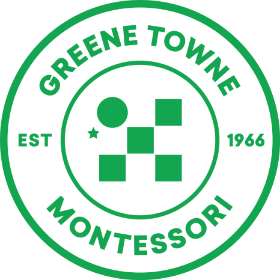Age: 3 – 6 years
In this thoughtfully designed environment, young learners are invited to explore, create, and discover. Each morning begins with warm greetings from teachers, staff, and classmates, setting the tone for a purposeful day of learning.
In the Montessori prepared environment – filled with hands-on materials tailored to this stage of development – children engage in activities that foster independence, concentration, and collaboration. They learn how to work on their own and as part of a community.
The Montessori teacher acts as a guide and trusted resource, helping each child build confidence and develop new skills at their own pace. The classroom includes children 3 to 6 years old, allowing for rich peer learning and mentorship. Preschool and Kindergarten students remain in the same morning classroom with the same teacher throughout their time at Greene Towne, creating a strong foundation of trust and continuity.
The Kindergarten Year: A Culmination of the Primary Program
Kindergarten at Greene Towne is the final and most dynamic year of the Primary Program. As the oldest students in the mixed-age classroom, Kindergartners take on leadership roles—mentoring younger classmates, working on more advanced projects, and deepening their love of learning.
Each day, Kindergarten students engage in rich, hands-on work across subjects like reading, writing, mathematical operations, geography, science, and art. Whether solving equations with bead bars, mapping the countries of Africa, or writing original stories, children are encouraged to follow their curiosity and spend focused time on meaningful work. Class-wide activities such as thematic lessons, storytelling, and music round out their mornings.
Beyond the classroom, Greene Towne Kindergartners expand their horizons with field trips, library visits, and special events like Lunch-Around-the-World, where they explore cultures and cuisines from across the globe.
As Kindergartners, children grow in confidence and independence, becoming mentors, role models, and thoughtful leaders of their classroom community.
Daily routine and Montessori Work Cycle:
In the Primary classroom, children thrive within a calm, purposeful routine designed to support independence, concentration, and a love of learning. Each day begins with a warm greeting and smooth transition into the classroom. Children then engage in an uninterrupted Montessori work cycle, where they choose from a wide range of hands-on materials across subjects like practical life, sensorial exploration, math, language, and cultural studies.
The lead teacher observes and offers individualized lessons that align with and support each child’s interests and stage of development. This focused work time nurtures deep concentration, intrinsic motivation, and the development of critical thinking skills to lay the foundation for abstract thinking and problem solving.
Throughout the day, children also participate in group activities, like outdoor play, snack and lunch routines, and circle time, which help promote social development, cooperation, and a strong sense of classroom community. The daily rhythm is intentionally structured to help children grow in confidence, curiosity, and care for self and others.
Curriculum:
Practical Life includes everyday activities like pouring, sweeping, buttoning, and food preparation. These hands-on tasks help children develop coordination, independence, concentration, and a sense of order; skills that form the foundation for all future learning to take place.
This area of the Montessori classroom also introduces grace and courtesy, where children practice respectful interactions such as waiting their turn, offering help, and using polite language. Through these real and purposeful activities, children experience the satisfaction of contributing to their environment, which fosters a sense of pride and belonging.
Since this work is meaningful and relevant to their daily lives, children are naturally drawn to this area of the room. They build intrinsic motivation as they choose tasks, repeat them with focus, and gradually master new skills. Over time, this encourages a deep sense of self-confidence and a joyful desire to learn.
The Sensorial area of the primary classroom helps children refine their senses through hands-on materials that isolate qualities like color, size, shape, texture, sound, and smell. These materials support the development of observation, comparison, and classification skills, laying the groundwork for later learning in math, language, and science. By exploring and naming the world around them, children enhance their concentration, sense of order, and environmental awareness.
In the Primary classroom, the math area introduces foundational concepts using concrete, didactic materials that make abstract ideas tangible and engaging. Children explore numbers, quantity, and place value with tools such as number rods, sandpaper numerals, and golden beads. These materials support a natural progression from hands-on exploration to abstract understanding, helping children build a strong sense of number, order, and pattern. With repeated use, they move confidently into mathematical operations like addition, subtraction, multiplication, and division in a clear, developmentally appropriate way.
The language area in the Primary classroom supports the natural development of spoken and written language through a rich, hands-on approach. Children build vocabulary, phonemic awareness, and letter recognition using Montessori materials such as sandpaper letters, classified cards, and the movable alphabet. These tools guide children naturally from spoken language to writing and reading at their own developmental pace. Through rich conversations, stories, songs, and purposeful activities, children gain confidence, communication skills, and a lasting love of language.
The cultural area of the Primary classroom introduces children to the wider world through hands-on exploration of geography, science, history, art, and music. Children work with maps, globes, materials from nature, timelines, and artifacts that spark curiosity and help them make meaningful connections to people, places, and cultures beyond their own. These experiences broaden their understanding, foster respect for diversity, and lay the foundation for global awareness and scientific thinking—all through developmentally appropriate, joyful discovery.
Schedule for Primary School Day Program
All children attend five mornings a week with the option to add early afternoons. Kindergartners attend from 8 a.m. – 3 p.m.

To learn more about the Primary All Day Program and its schedule, click here.


